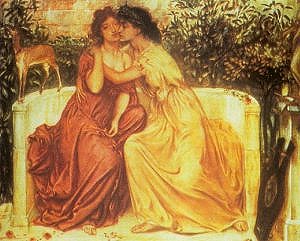Sacred Texts
Classics
Sappho
Buy this book at Amazon

|
The Songs of Bilitis
by Pierre Louÿs
translated by Alvah C. Bessie
illustrations by Willy Pogany
[1926, not renewed]
|
Contents
Start Reading
First published in Paris in 1894, this purports to be translations
of poems by a woman named Bilitis,
a contemporary and acquaintance of Sappho.
This caused a sensation, not only because finding an intact cache of
poems from a completely unknown Greek poet circa 600 B.C. would be
a miracle, but because of its open
and sensitive exploration of lesbian eroticism.
Actually Bilitis never existed.
The poems were a clever forgery by Pierre Louÿs--the
"translator"; to lend weight, he
had even included a bibliography with bogus supporting works.
Louÿs actually did have a good command of the classics,
and he salted Bilitis with a number of quotations
from real poets, including Sappho, to make it even more convincing.
Just because this is a fake does not detract from its literary value.
And just because it was written by a man did not
prevent it from acquiring cultural significance for Lesbians.
In fact, one of the earliest
organizations of Lesbians in the United States
was called the Daughters of Bilitis (although this could have been because
it was a reference that would elude most people).
Prior to the 1960s, in the US, English translations of Bilitis were
considered risqué enough to
warrant lavish privately printed limited editions.
This was a dodge to circumvent now-defunct censorship laws.
The version this particular etext is based on was printed in 1926,
and has sensual and very witty Art Deco illustrations by Wily Pogany.
For more information on the context of this work,
refer to my essay on Sappho.
--J. B. Hare
Title Page
Contents
The Life Of Bilitis
I. Bucolics In Pamphylia
I. Bucolics In Pamphylia
The Tree
Pastoral Song
Maternal Counsel
Bare Feet
The Old Man and the Nymphs
Song
Pedestrian
Awakening
Rain
Flowers
Impatience
Comparisons
The Stream in the Wood
Phitta Meliai
The Symbolic Ring
Moonlight Dances
Little Children
Stories
Her Friend, Married
Confidences
The Moon with Blue Eyes
Song
Lykas
Offering to the Goddess
The Accommodating Friend
Prayer to Persephone
Game of Dice
The Distaff
The Flute
Tresses
The Goblet
Roses in the Night
Regrets
Interrupted Sleep
To the Washerwomen
Song
Bilitis
The Cottage
The Lost Letter
Song
The Vow
Night
Cradle Song
The Tomb of the Naïads
II. Elegies At Mytilene
II. Elegies At Mytilene
To the Ship
Psappha
The Dance of Glottis and Kyse
Counsels
Incertitude
Meeting
The Little Clay Astarte
Desire
The Wedding
The Living Past
Metamorphosis
The Nameless Tomb
Mnasidika's Three Beauties
The Grotto of the Nymphs
Mnasidika's Breasts
The Doll
Tenderness
Games
Shadowlight
The Sleeper
The Kiss
Jealous Cares
The Mad Embrace
The Heart
Night Words
Absence
Love
Purification
Mnasidika's Lullaby
Sea-Side Promenade
The Object
Evening by the Fire
Prayers
Eyes
Cosmetics
Mnasidika's Silence
Scene
Waiting
Solitude
Letter
Attempt
Effort
To Gyrinno
Last Attempt
Rending Memory
The Wax Doll
Funeral Chant
III. Epigrams in the Isle of Cyprus
III. Epigrams in the Isle of Cyprus
Hymn to Astarte
Hymn to the Night
The Maenads
The Sea of Kypris
The Priestesses of Astarte
The Mysteries
Egyptian Courtesans
I Sing my Flesh and my Life
Perfumes
Conversation
The Torn Dress
Jewels
The Impartial One
Clear Water of the Basin
Desire
The Inn
Domesticity
The Bath
To Her Breasts
Mydzouris
The Triumph of Bilitis
To the Wooden God
Dancer with Castanets
The Flute Player
The Warm Girdle
To a Happy Husband
To One Who Has Strayed
Intimacies
The Command
The Masque of Pasiphaë
The Juggleress
The Flower Dance
Violence
Song
Advice to a Lover
Friends for Dinner
The Tomb of a Young Courtesan
The Little Flower-Vendor
Dispute
Melancholy
Little Phanion
Information
The Vendor of Women
Stranger
Memory of Mnasidika
Young Mother
The Unknown
Trickery
The Last Lover
The Dove
Morning Rain
True Death
The Tomb of Bilitis
The Tomb of Bilitis
First Epitaph
Second Epitaph
Last Epitaph
Bibliography
Translator's Notes

